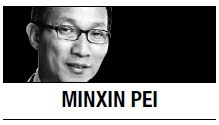CLAREMONT, California ― In the boldest move yet since President Xi Jinping launched his anti-corruption campaign, China has announced the start of a formal investigation into “serious disciplinary violations” by one of the Chinese Communist Party’s most senior figures, Zhou Yongkang. Though rumors of Zhou’s political demise had been circulating for nearly a year, anyone familiar with Chinese political intrigue knew that, until the CCP

made it official, Zhou’s many powerful patrons and cronies could still save him. Now it is official: a “mega-tiger” has been brought down. But is that what China really needs?
Since 2012, when Xi began “hunting tigers,” as he put it, three dozen government ministers, provincial governors, and other high-level officials have fallen into his net. But Zhou is no ordinary tiger. A former member of the Politburo Standing Committee, the CCP’s top decision-making body, Zhou was considered untouchable.
Since the end of the Cultural Revolution, the CCP has adhered to the implicit rule that members of the Politburo Standing Committee, sitting or retired, enjoy immunity from criminal prosecution. Some have, of course, been purged in power struggles, such as the one that led to the fall of Hua Guofeng, Mao’s immediate successor, in the early 1980s. But the defeated have typically retired quietly, and never faced formal corruption charges.
Given this history, the prosecution of Zhou is a watershed event ― far more significant than the riveting trial of the disgraced former Chongqing Communist Party Secretary Bo Xilai a year ago. It unambiguously demonstrates Xi’s personal authority and political resolve. But the question remains: What exactly does Xi hope to achieve with China’s most fearsome anti-corruption campaign in more than three decades?
The conventional wisdom is that the threat of prosecution serves Xi’s goals of consolidating power and compelling the bureaucracy to implement economic reforms that run counter to its interests. The two prongs of Xi’s political strategy ― cleansing the Party and reinvigorating China’s economy ― are thus complementary and interdependent.
This strategy has considerable merit. But even the Machiavellian dictum that a ruler should encourage his citizens’ fear rather than their love can go only so far. The most successful political leaders are skilled coalition-builders.
Consider Deng Xiaoping, China’s most successful reformer (the Tiananmen Square massacre of 1989 notwithstanding). The grand coalition that he forged, against all odds, upon his return to power in 1979 was essential to bringing about the economic transformation that followed.
The question today is thus not whether Xi has amassed enough authority to effect change in China (he has), but whether he has built a coalition capable of advancing his declared goal of reviving pro-market reforms. And, so far, the answer seems to be no.
Since taking over the presidency, Xi’s actions have been both resolute and contradictory. On one hand, he has been aggressively pursuing “tigers” and “flies” (lower-level officials), while curbing, at least temporarily, the privileges enjoyed by Chinese officials. On the other hand, he has launched an equally ferocious campaign against political liberalization, arresting and jailing leading human-rights activists and cracking down on China’s once-vibrant social media.
The risks of waging a two-front war are obvious. If Xi’s fight against corruption is genuine, it will engender fear and resentment among the Chinese bureaucracy. While officials feign compliance with Xi’s economic-reform agenda, they will seek any opportunity to stymie it. The absence of significant real progress since Xi unveiled his economic blueprint last November suggests that this is already happening.
At the same time, Xi’s tough stance against political reform is diminishing hope among liberals. Of course, this group ― including intellectuals, social activists, journalists, and progressive private entrepreneurs ― has little institutional power. What it does have is the capacity to influence ordinary Chinese ― making them a valuable addition to a pro-reform coalition. Deng recognized this potential in the 1980s; unless Xi follows suit, he will find it increasingly difficult to rally the public behind his vision for China’s future.
This is not to say that caging Zhou was not a good move. But Xi must now shift his focus from bagging another quarry to winning over new and perhaps unexpected allies. His long-term success ― and that of China ― depends on it.
By Minxin Pei
Minxin Pei is professor of government at Claremont McKenna College and a non-resident senior fellow at the German Marshall Fund of the U.S. ― Ed.
(Project Syndicate)








